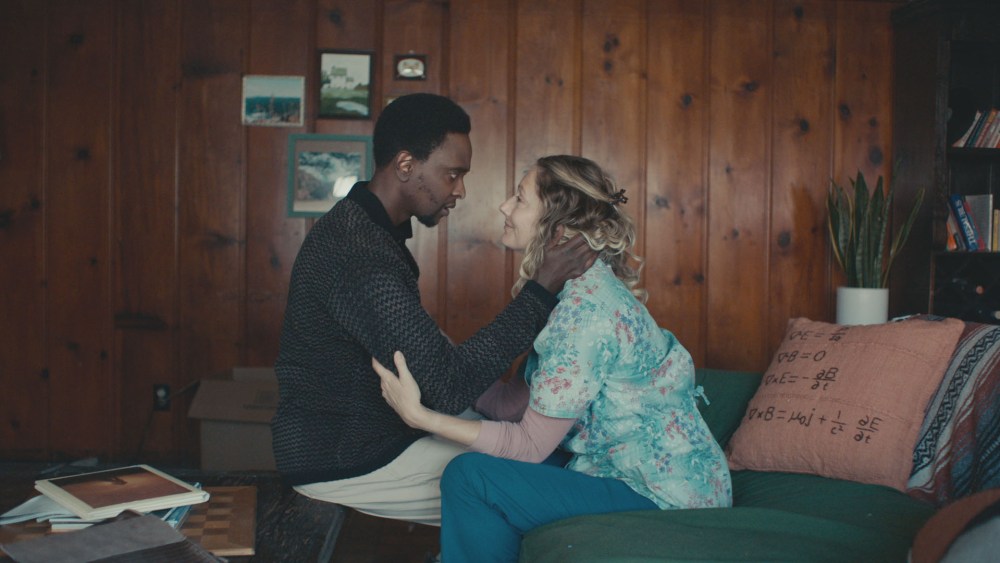
It’s become increasingly common to lend genre films some semblance of emotional depth by having their protagonists burdened from the start with profound grief or loss. That is especially the case with “Aporia,” producer Jared Moshe’s third feature as writer-director. Its variation on a particular kind of fantasy premise (often involving time travel) underlines the familiar wisdom of “Be careful what you wish for,” as the ability to alter tragic past events only ends up complicating the present for our main characters.
Starring Judy Greer as a recent widow in a lower-middle-class Los Angeles milieu, this is more an effective drama with a novel hook than any typically violence- or spectacle-driven dive into the fantastic— the lo-fi sci-fi on tap here requires nary a special effect. Those expecting more action or thrills may be underwhelmed. But “Aporia” (the title of which is a term for a state of doubt or uncertainty) will reward viewers seeking a thoughtful exploration of imaginative themes that usually come adorned in showier bells and whistles. Following its Fantasia premiere, Well Go plans a limited release to U.S. theaters on August 11.
An opening glimpse of domestic bliss turns out to be just a painful memory for Sophie Rice (Greer), whose husband Malcolm (Edi Gathegi) got killed by a drunk driver (Adam O’Byrne) eight months prior. As she deals with the perp’s court trial and struggles to stay financially afloat, daughter Riley (Faithe Herman) is faring even worse. Since her beloved father’s death, the hitherto exemplary student has been skipping school, failing classes, picking fights and directing open hostility at her mother. Without Malcolm, their lives are coming unglued.
Witnessing that freefall, family friend Jabir (Payman Maadi) cautiously extends a possible solution. A refugee from an unnamed nation whose dictatorship killed everyone else in his family, he’s a physicist now reduced to driving a cab — circumstances that cemented his friendship with Malcolm, whose own career in scientific engineering ended after a workplace mishap left him part-paralyzed. It turns out they’d been working together on a project in Jabir’s spare bedroom: What was intended to be a time machine, but instead turned out to have a more narrow application. To whit, if given precise coordinates, it can kill someone in the past. What if the drunk driver could be offed before the fatal accident occurred?
Sophie is incredulous, though after a new pileup of crises, she’s willing to try anything. The Rube Goldbergian apparatus revs up, and disgorges a puff of smoke; nothing seems to have happened. Yet soon it’s apparent something indeed has: Malcolm is back, unaware he’d ever been gone, his wife and colleague the only parties wise to this miracle. Eventually he has to be told, however, so now the three adults have a grave responsibility to weigh. Should the machine be used again, for instance to eliminate a terrorist or school shooter prior to their mass-murdering acts? Or simply to help other individuals in dire straits — like the widow (Whitney Morgan Cox) and daughter (Veda Cienfuegos) of that inebriate driver, their current plight worsened by the bankruptcy brought on by a Bernie Madoff-like financial predator?
Emphasizing emotional reactions over gimmicky plot intricacies of reality-rewriting as in “Edge of Tomorrow” or “The Butterfly Effect,” “Aporia” concerns itself mostly with the awkward tradeoffs that our characters are forced into by their choices. They cannot predict what wider, incidental impacts a death will have on the world around them, or their own lives. What’s more, those who use the machine are the only ones aware of its impact — and oblivious to whatever changes have occurred in the interim.
So Jabir, Mal and Sophie must cope with “new normals” they alone are surprised by, which can include drastic alterations to employment, relationship or other statuses. As the saying goes, no good deed goes unpunished. Messing about with the fabric of existence, even altruistically, can render it unrecognizable.
These moral and logistical dilemnas are satisfyingly addressed in Moshe’s screenplay, even if some audience members may be frustrated that the results of a climactic collective decision are left to our imagination, in a “lady or tiger?”-style fadeout. That creative choice remains faithful to the central characterizations, which are emphatically relatable — though tonally it might have been better to have Greer, otherwise strong as the empathetic Sophie, spend a bit less time on the verge of tears.
Shot primarily in El Sereno, the film’s locations capture a working-class Los Angeles not frequently seen on screen, let alone utilized in this kind of genre piece. In a similar spirit, the tech and design contributions are assured but unobtrusive, their straightforward modesty of style keeping focus securely trained on everyday matters of marriage, family, child-rearing, finances, and so forth. Even “the machine” itself is basically just an expanded version of a classic junk-drawer tangle of old cords and spare electronic parts.
Still, the concept provides enough narrative drive to prevent “Aporia” from settling into mere depressing kitchen-sink realism. While it may not stress fear or fancy as much as most such comparable tales, this quasi-scientific fiction nonetheless easily holds us in suspense, wondering just where so much monkeying with the time-space continuum will lead.













